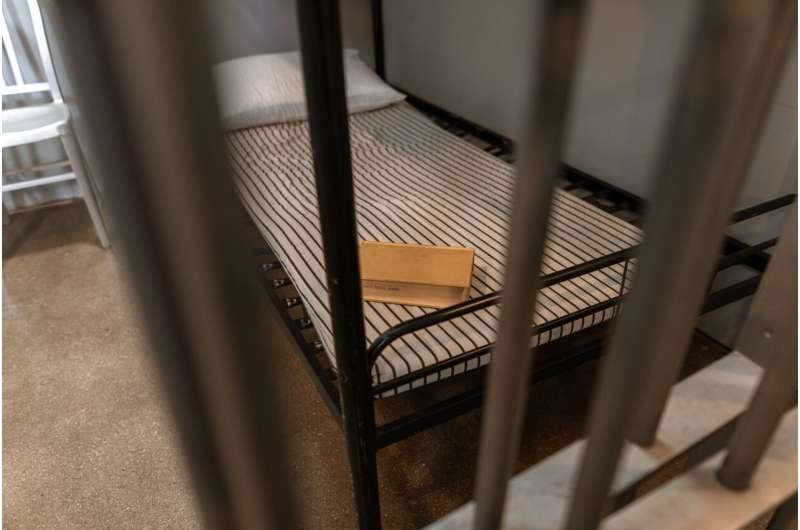This article has been reviewed according to Science X's editorial process and policies. Editors have highlighted the following attributes while ensuring the content's credibility:
fact-checked
proofread
More than half the Aussie prison population report a mental health diagnosis

More than half of prison entrants surveyed for the 6th survey on the health of people in Australian prisons said they had been previously diagnosed with a mental health condition and many reported a family history of incarceration.
The Australian Institute of Health and Welfare (AIHW) today released "The health of people in Australia's prisons 2022," which includes information gathered from 73 of 87 prisons in scope for the survey across Australia (excluding Victoria) to develop a comprehensive view of the health, well-being and social factors that affect people before, during and after time in prison.
Most prison dischargees surveyed for the report were happy with the health care they received in prison.
"Many people in prison come from disadvantaged backgrounds, with poorer physical and mental health outcomes than the general population," said AIHW spokesperson Amanda Donges.
"They are less likely to have accessed health care services in the community, and more likely to have a history of risky behaviors that can affect health and well-being."
Nearly one-third (31%) of prison entrants had an education level of Year 9 or below. In the 30 days before entering prison, more than 4 in 10 (43%) were homeless, nearly half (46%) were unemployed and 1 in 20 (5.1%) were studying. More than half of surveyed prison entrants (51%) reported a previous diagnosis of a mental health condition, including alcohol and other drug use disorders.
Almost three quarters (73%) of prison entrants reported using illicit drugs at least once during the previous 12 months.
One in four (25%) prison entrants reported that one or more parents or caregivers had been in prison when they were a child. This was more than twice as likely among Aboriginal and Torres Strait Islander (First Nations) entrants (36%) than non-Indigenous entrants (15%). Four in ten (42%) prison entrants aged 18–24 had a parent or caregiver in prison during their childhood.
"The majority of people reported access to a range of health care and other services in prison. Nearly three quarters (72%) of prison dischargees rated the health care they received in the prison clinic as good or excellent," Donges said.
"Four in five (80%) reported their physical health improved or stayed the same while in prison. A similar proportion (81%) reported their mental health improved or stayed the same while in prison."
Adults aged 18–44 in the general community (65%) were about 1.5 times more likely than prison entrants (42%) and prison dischargees (41%) of the same age to rate their health as very good or excellent.
First Nations dischargees were more likely to rate their physical health as very good or excellent (45%) than non-Indigenous dischargees (37%).
Nearly half (48%) of prison dischargees expected to be homeless on release from prison, with 45% planning to sleep in short term or emergency accommodation and 2.8% expected to sleep rough. About half (52%) of prison dischargees had their own stable accommodation arranged.
There are more than 62,000 receptions into, and releases out of, Australia's prisons each year.
More information: The health of people in Australia's prisons 2022, Australian Institute of Health and Welfare (2023). DOI: 10.25816/1md4-5g46


















